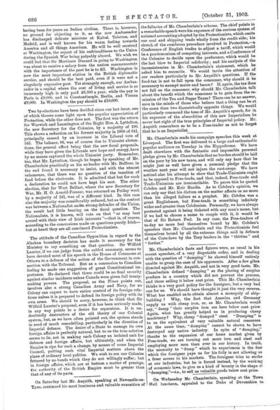On Saturday last Mr. Asquith, speaking at Newcastle-on- Tyne, continued
his most luminous and valuable exposition of the fallacies of Mr. Chamberlain's scheme. The chief points in a remarkable speech were his exposure of the curious system of national accounting adopted by the Protectionists, which omits our coal and shipping trade wholly from the credit side; his sketch of the cumbrous procedure involved in Protection,—a Conference of English trades to adjust a tariff, which would be a pandemonium of competing interests, and a Conference of the Colonies to decide upon the preference, which would be the last blow to Imperial solidarity ; and his analysis of the inconsistencies in Mr. Chamberlain's statement, which he asked him to reconcile. We would invite the attention of our readers particularly to Mr. Asquith's questions. If the food-tax is not to fall upon the consumer, why should it be necessary to exempt maize and bacon? If, again, the tax does not fall on the consumer, why should Mr. Chamberlain talk about the benefit which the consumer is to gain from the re- mission of the Tea and Sugar Taxes ? There can be no answer, save in the minds of those who believe that a thing can be at the same time two diametrically opposite things. We would particularly commend the tone of Mr. Asquith's speech, for in his exposure of the absurdities of this new Imperialism he never lost sight of the true principles of Imperial policy. Mr. Asquith remembers so to be a Free-trader as not to forget that he is an Imperialist.


















































 Previous page
Previous page